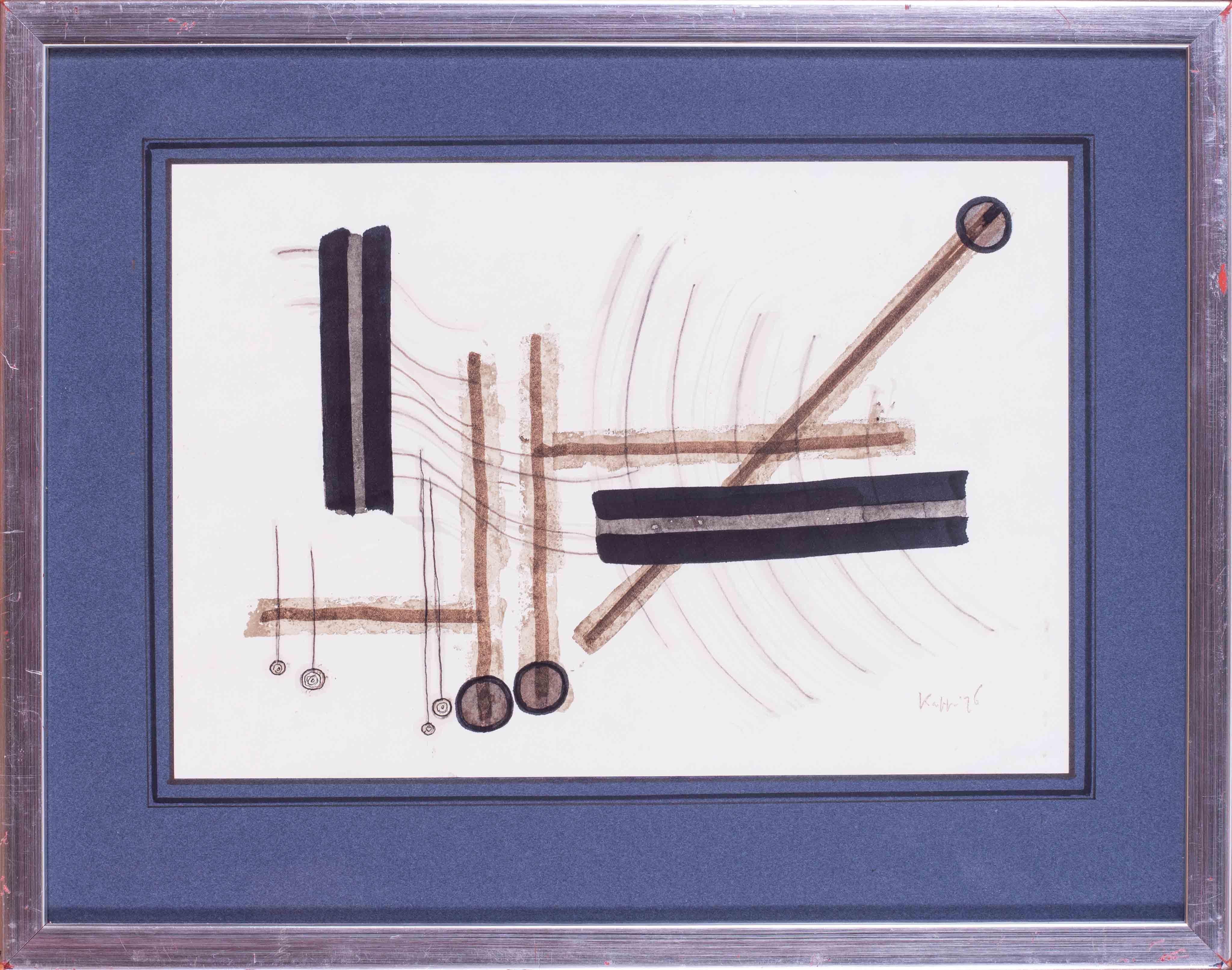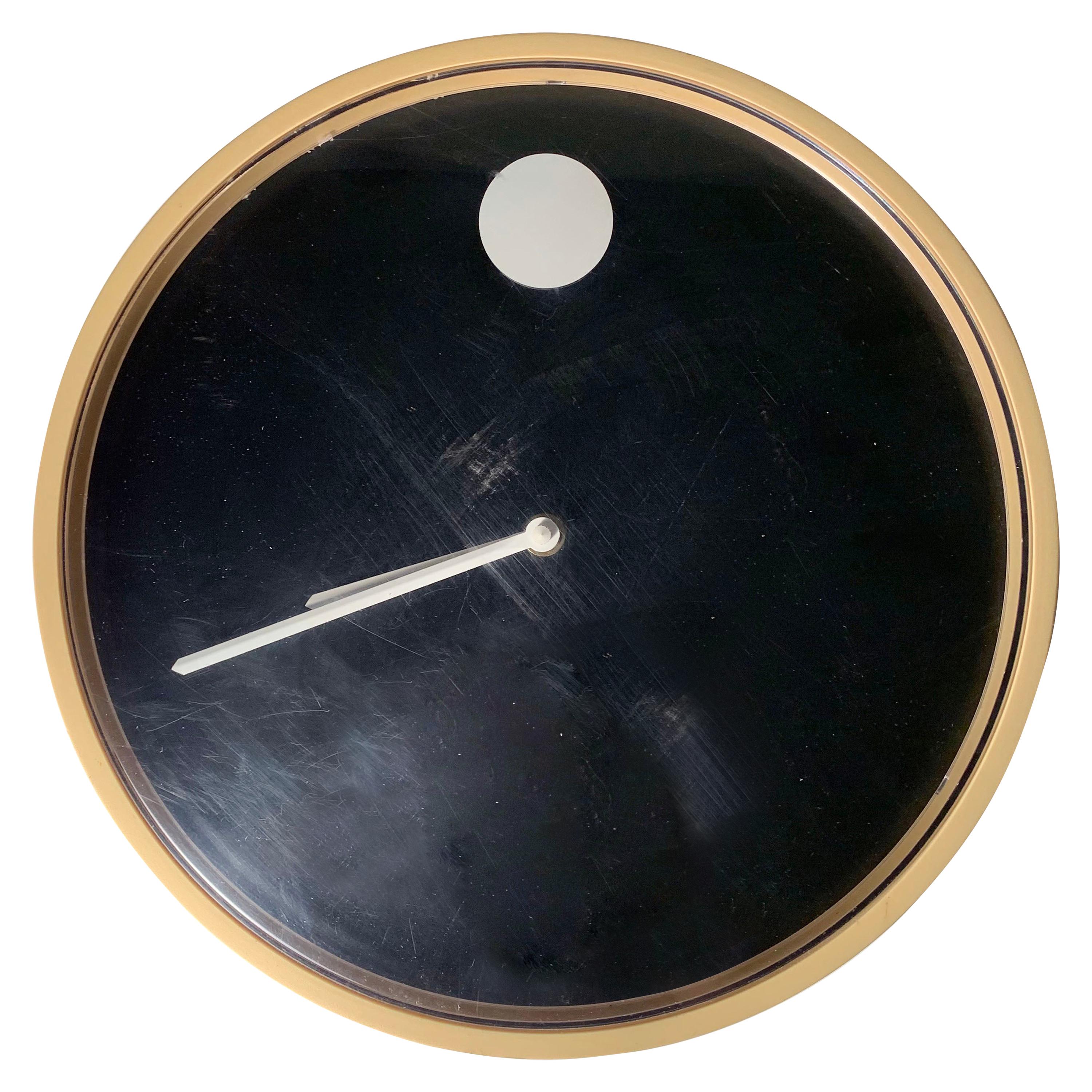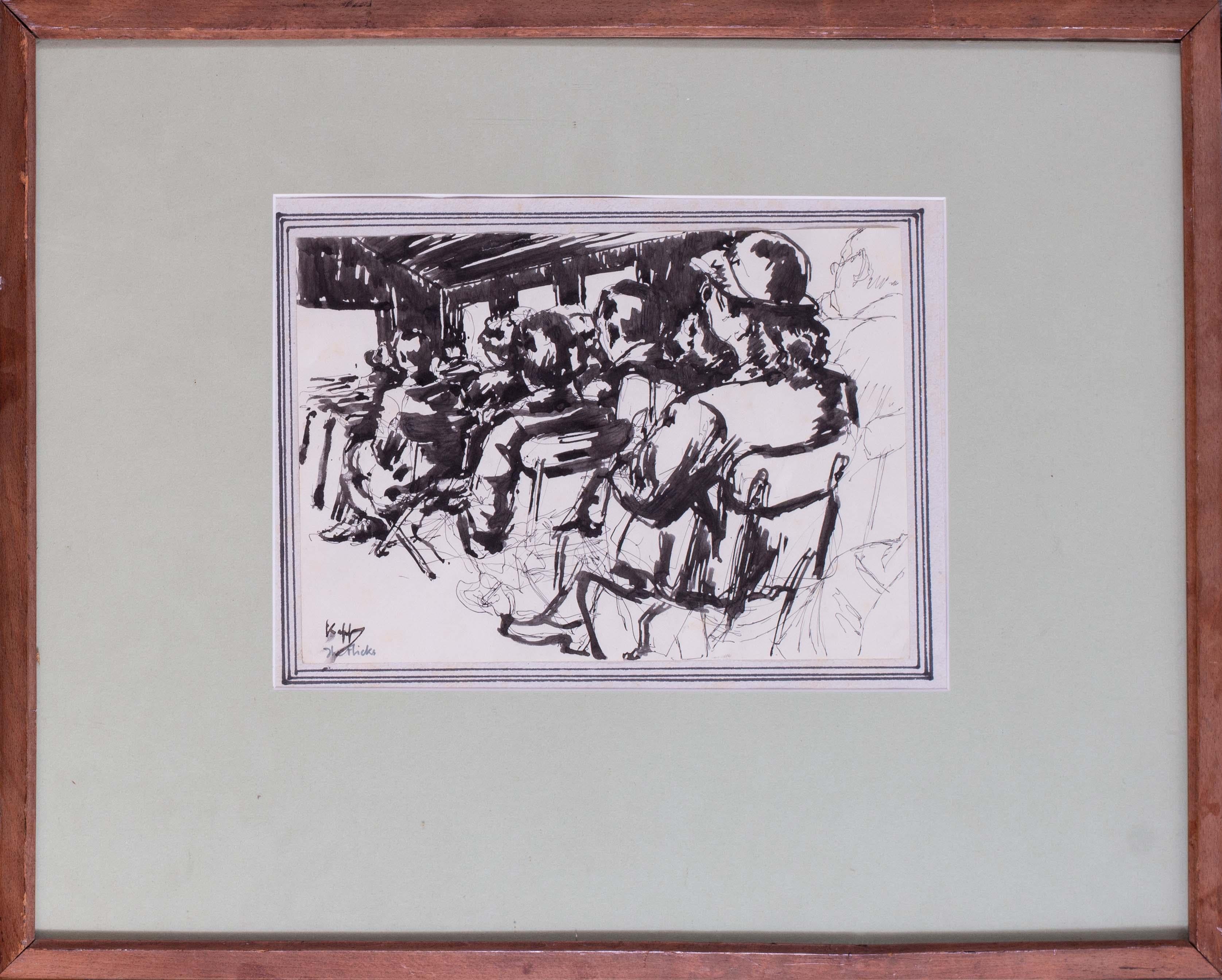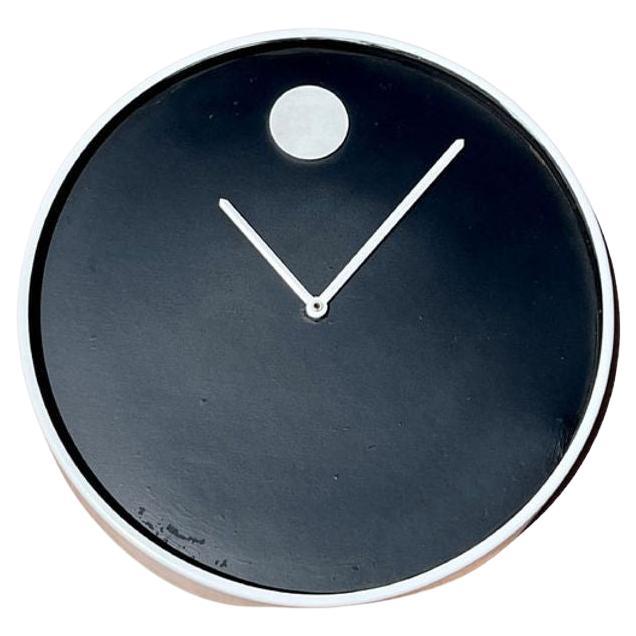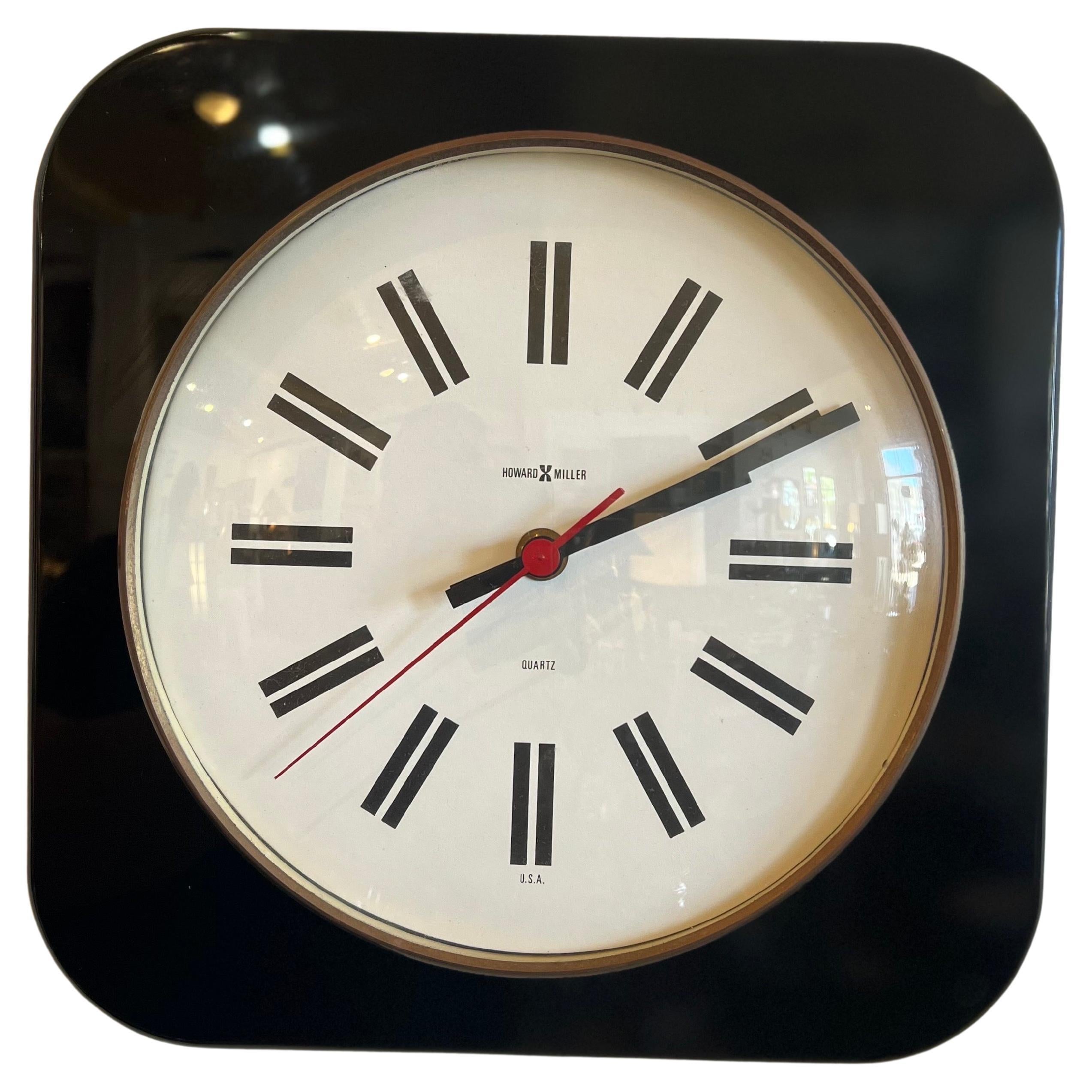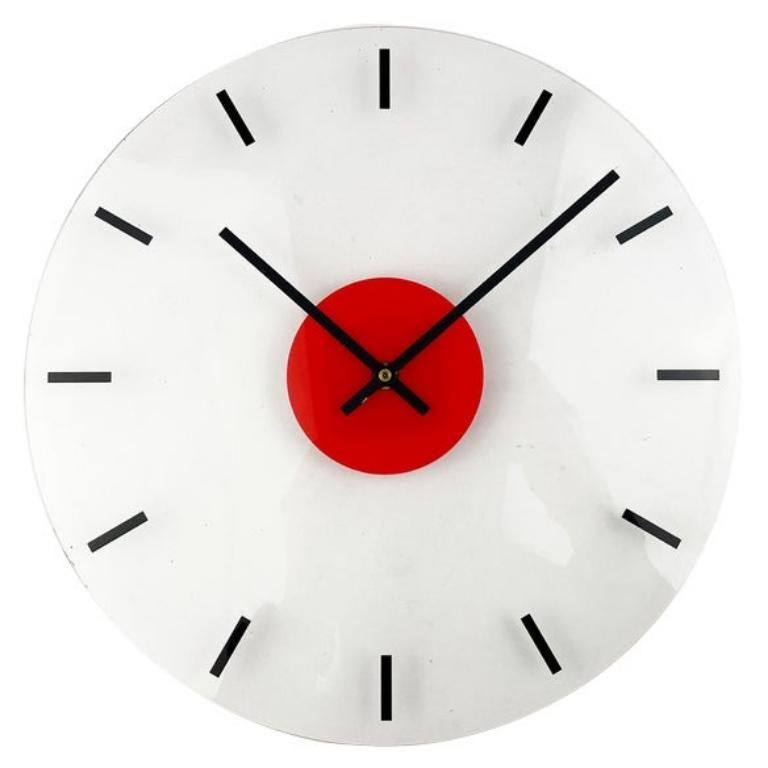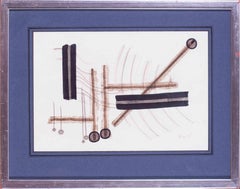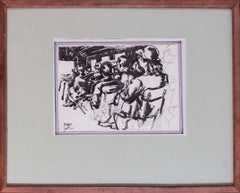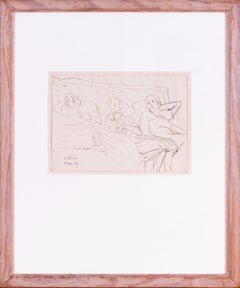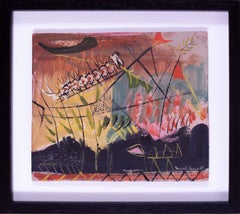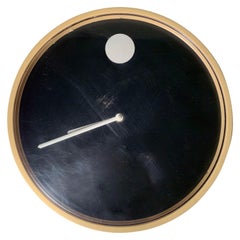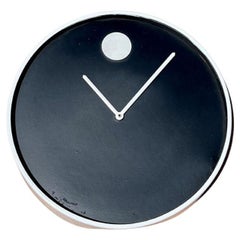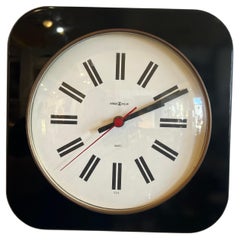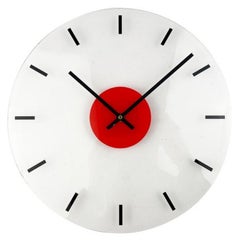Items Similar to Mid Century Modern British 'What's the Time?' by British German Kapp, 1975
Want more images or videos?
Request additional images or videos from the seller
1 of 6
Edmond Xavier KappMid Century Modern British 'What's the Time?' by British German Kapp, 19751975
1975
$857.31
£620
€730.44
CA$1,187.85
A$1,289
CHF 683.06
MX$15,808.93
NOK 8,452.76
SEK 7,987.41
DKK 5,453.06
About the Item
Eduard Xavier Kapp (British, 1890 – 1978)
What’s the Time?
Pen and crayon, tondo
Signed and dated ‘Kapp 75’ (in the centre)
8.1/2 x 8.1/2 in. (21.6 x 21.6 cm.)
Edmond Kapp was born in Islington, London, on 5 November 1890, of American and German Jewish parentage. He gave himself the middle initial ‘X’ – sometimes said to stand for Xavier – to distinguish himself from his father Emil Kapp, who was a wine merchant. However, his parents called him ‘Eddie’ while his wife and friends knew him as ‘Peter’.
During his early years, Kapp was continually ill and, while convalescing, entertained himself by drawing at home. As his health improved, he attended Dame Alice Owen’s School, Islington (1903-10), with periods at Berlin University (1909) and L’Institut Français pour les Etrangers, Paris (1909). He then read Languages at Christ’s College, Cambridge (1910-13), though spent most of his time writing and drawing.
Kapp took a studio in London, and worked intensively until the outbreak of the First World War, contributing to the Daily News, the Onlooker and other periodicals. During the war, he served as a 2nd Lieutenant in the Royal Sussex Regiment on the Western Front, and then in Intelligence, rising to the position of Staff Captain on Haig’s Staff. Finally, he founded and directed the Neutral Press Counter-propaganda Section.
In 1919, Kapp returned to London and, after abortive periods at three art schools, worked alone. In that year, he made his name with an exhibition of caricatures, held at Furst’s Gallery, London, and accompanied by a catalogue introduced by Max Beerbohm. This soon led to contracts with three London periodicals and a book of caricatures, Personalities, published by Martin Secker. Through the 1920s and 30s, his drawings of musicians and other personalities appeared in a wide variety of periodicals, most notably Time & Tide; were collected in further volumes; and were exhibited at the Leicester Galleries. He considered himself to be a ‘character-portraitist’, producing images of psychological not satirical power, and disliking the term ‘caricature’.
Between the wars, Kapp developed other aspects of his artistic talents, the desire to study and the search for subject matter often taking him abroad. For instance, work at the British Academy, Rome, under Antonio Sciortino, and with the American painter, Maurice Sterne, led him to produce his first oils (1923); while an introduction to the League of Nations in Geneva allowed him to use his new-found skill in lithography to produce portraits of twenty-five of its members (1933-35). This expansive and exploratory attitude to his work resulted in an increase in patrons and exhibitions, and in important artistic friendships, notably with Picasso (Picasso sat for Kapp in 1938).
Kapp worked as an Official War Artist during the Second World War, and then as an Official Artist to UNESCO. In the post-war period, he had a studio in Beausoleil, Alpes Maritimes, and explored abstract painting ‘passionately, though without dogmatism’ (Edmond Kapp, London: Whitechapel Art Gallery, 1961, page 8).
Kapp died on 29 October 1978. His sister – the artist Helen Kapp – had died earlier in the same month. The first of his three wives was Yvonne Kapp, biographer of Eleanor Marx and author of the memoir, Time Will Tell. They had visited Beerbohm in Rapallo during their honeymoon in 1923.
His work is represented in numerous public collections, including the National Portrait Gallery; The Barber Institute of Fine Arts (University of Birmingham), the Fitzwilliam Museum (Cambridge) and Manchester Art Gallery; and Albright-Knox Art Gallery (Buffalo).
- Creator:Edmond Xavier Kapp (1890 - 1978, British)
- Creation Year:1975
- Dimensions:Height: 8.5 in (21.59 cm)Width: 8.5 in (21.59 cm)Depth: 1 in (2.54 cm)
- Medium:
- Movement & Style:
- Period:
- Condition:In good order, in a black mount, behind glass in a black frame.
- Gallery Location:Petworth, GB
- Reference Number:1stDibs: LU540313641042
About the Seller
4.9
Platinum Seller
Premium sellers with a 4.7+ rating and 24-hour response times
Established in 2010
1stDibs seller since 2017
272 sales on 1stDibs
Typical response time: 2 hours
- ShippingRetrieving quote...Shipping from: Petworth, United Kingdom
- Return Policy
Authenticity Guarantee
In the unlikely event there’s an issue with an item’s authenticity, contact us within 1 year for a full refund. DetailsMoney-Back Guarantee
If your item is not as described, is damaged in transit, or does not arrive, contact us within 7 days for a full refund. Details24-Hour Cancellation
You have a 24-hour grace period in which to reconsider your purchase, with no questions asked.Vetted Professional Sellers
Our world-class sellers must adhere to strict standards for service and quality, maintaining the integrity of our listings.Price-Match Guarantee
If you find that a seller listed the same item for a lower price elsewhere, we’ll match it.Trusted Global Delivery
Our best-in-class carrier network provides specialized shipping options worldwide, including custom delivery.More From This Seller
View AllMid Century Modern British 'Toccata 23' by British German illustrator Kapp, 1976
Located in Petworth, West Sussex
Edmond Xavier Kapp (British, 1890 – 1978)
Toccata 23
Ink on paper
Signed and dated ‘Kapp 76’ (lower right)
9.1/2 x 14 in. (24.3 x 35.5 cm.)
Edmond Kapp was born in Islington, London, on 5 November 1890, of American and German Jewish parentage. He gave himself the middle initial ‘X’ – sometimes said to stand for Xavier – to distinguish himself from his father Emil Kapp, who was a wine merchant. However, his parents called him ‘Eddie’ while his wife and friends knew him as ‘Peter’.
During his early years, Kapp was continually ill and, while convalescing, entertained himself by drawing at home. As his health improved, he attended Dame Alice Owen’s School, Islington (1903-10), with periods at Berlin University (1909) and L’Institut Français pour les Etrangers, Paris (1909). He then read Languages at Christ’s College, Cambridge (1910-13), though spent most of his time writing and drawing.
Kapp took a studio in London, and worked intensively until the outbreak of the First World War, contributing to the Daily News, the Onlooker and other periodicals. During the war, he served as a 2nd Lieutenant in the Royal Sussex Regiment on the Western Front, and then in Intelligence, rising to the position of Staff Captain on Haig’s Staff. Finally, he founded and directed the Neutral Press Counter-propaganda Section.
In 1919, Kapp returned to London and, after abortive periods at three art schools, worked alone. In that year, he made his name with an exhibition of caricatures, held at Furst’s Gallery, London, and accompanied by a catalogue introduced by Max Beerbohm. This soon led to contracts with three London periodicals and a book of caricatures, Personalities, published by Martin Secker. Through the 1920s and 30s, his drawings of musicians and other personalities appeared in a wide variety of periodicals, most notably Time & Tide; were collected in further volumes; and were exhibited at the Leicester Galleries. He considered himself to be a ‘character-portraitist’, producing images of psychological not satirical power, and disliking the term ‘caricature’.
Between the wars, Kapp developed other aspects of his artistic talents, the desire to study and the search for subject matter often taking him abroad. For instance, work at the British Academy, Rome, under Antonio Sciortino...
Category
Mid-20th Century Modern Abstract Drawings and Watercolors
Materials
Paper, Ink
Mid Century Modern British 'The Flicks' by British German illustrator Kapp
Located in Petworth, West Sussex
Edmond Xavier Kapp (British, 1890 – 1978)
The Flicks
Ink on paper
Signed and inscribed ‘Kapp The Flicks’ (Lower left)
8.3/8 x 12.7/8 in. (21.2 x 30.1 cm.)
Provenance: From the estate...
Category
Mid-20th Century Modern Figurative Drawings and Watercolors
Materials
Paper, Ink
Mid Century Modern British 'Listeners' by British German illustrator Kapp, 1959
Located in Petworth, West Sussex
Edmond Xavier Kapp (British, 1890 – 1978)
Listeners
Inkpen
Signed, inscribed and date ‘Listeners / Kapp 59’ (lower left)
7.5/8 x 10.1/2 in. (19.4 x 26.7 cm.)
Edmond Kapp was born in Islington, London, on 5 November 1890, of American and German Jewish parentage. He gave himself the middle initial ‘X’ – sometimes said to stand for Xavier – to distinguish himself from his father Emil Kapp, who was a wine merchant. However, his parents called him ‘Eddie’ while his wife and friends knew him as ‘Peter’.
During his early years, Kapp was continually ill and, while convalescing, entertained himself by drawing at home. As his health improved, he attended Dame Alice Owen’s School, Islington (1903-10), with periods at Berlin University (1909) and L’Institut Français pour les Etrangers, Paris (1909). He then read Languages at Christ’s College, Cambridge (1910-13), though spent most of his time writing and drawing.
Kapp took a studio in London, and worked intensively until the outbreak of the First World War, contributing to the Daily News, the Onlooker and other periodicals. During the war, he served as a 2nd Lieutenant in the Royal Sussex Regiment on the Western Front, and then in Intelligence, rising to the position of Staff Captain on Haig’s Staff. Finally, he founded and directed the Neutral Press Counter-propaganda Section.
In 1919, Kapp returned to London and, after abortive periods at three art schools, worked alone. In that year, he made his name with an exhibition of caricatures, held at Furst’s Gallery, London, and accompanied by a catalogue introduced by Max Beerbohm. This soon led to contracts with three London periodicals and a book of caricatures, Personalities, published by Martin Secker. Through the 1920s and 30s, his drawings of musicians and other personalities appeared in a wide variety of periodicals, most notably Time & Tide; were collected in further volumes; and were exhibited at the Leicester Galleries. He considered himself to be a ‘character-portraitist’, producing images of psychological not satirical power, and disliking the term ‘caricature’.
Between the wars, Kapp developed other aspects of his artistic talents, the desire to study and the search for subject matter often taking him abroad. For instance, work at the British Academy, Rome, under Antonio Sciortino...
Category
Mid-20th Century Modern Figurative Drawings and Watercolors
Materials
Paper, Ink
Modern British mid century gouache painting by Neo Romantic artist Latimer Sayer
By Derrick Latimer Sayer
Located in Petworth, West Sussex
Derrick Latimer Sayer (British, 1917 – 1992)
Caterpillar
Signed, inscribed and dated ‘CATERPILLAR’ (lower left), ‘Derrick Sayer 55’ (lower right)
Gouache
7.7/8 x 9.1/4 in. (20 x 23.5 cm.)
Derrick Latimer Sayer (1912–1992) has been described as a Neo-Romantic and pop artist, with a career that spanned from the spiritualism of postwar English landscapes, to the bright, optical playfulness of 1960s Pop art. Sayer had a distinguished start to his career, having studied at the Chelsea School of Art in the early 1930s under Graham Sutherland and Henry Moore.
In 1936 he founded the Mousehole Group Art School in Cornwall with fellow painters George Lamborn and Guy Allen, and for the next few years he exhibited at a number of small local galleries, while also executing commercial advertising work for major companies such as Shell Oil. The 1940s and 50s were a period of widespread travelling, teaching and experimentation for Sayer, as he founded the Army Art Centre in 1945, worked in the South of France in 1949 and displayed works at the Leicester, Redfern and Winton Galleries across the 1950s. In 1966, he took up the helm as the Head of Art at the Chelsea Westminster Adult Education Institute, a position he held until his retirement in 1982. Ten of Derricks works can be found at the Chelsea Westminster Hospital Arts Project, hung alongside a permanent collection that includes Patrick Heron, Howard Hodgkin, and Sian Tucker.
Sayer was known for his studies of female nudes, particularly the examination of the nude in...
Category
20th Century Surrealist Abstract Paintings
Materials
Gouache
Mid Century Modern British 'Hot Soup' by British German illustrator Kapp, 1938
Located in Petworth, West Sussex
Eduard Xavier Kapp (British, 1890 – 1978)
Hot soup
Pen on paper
Inscribed and dated ‘Hot Soup / 15-12-38’ (upper right) and signed ‘kapp’ (lower right)
7.1/2 x 12.3/8 in. (19 x 31.5 cm.)
Edmond Kapp was born in Islington, London, on 5 November 1890, of American and German Jewish parentage. He gave himself the middle initial ‘X’ – sometimes said to stand for Xavier – to distinguish himself from his father Emil Kapp, who was a wine merchant. However, his parents called him ‘Eddie’ while his wife and friends knew him as ‘Peter’.
During his early years, Kapp was continually ill and, while convalescing, entertained himself by drawing at home. As his health improved, he attended Dame Alice Owen’s School, Islington (1903-10), with periods at Berlin University (1909) and L’Institut Français pour les Etrangers, Paris (1909). He then read Languages at Christ’s College, Cambridge (1910-13), though spent most of his time writing and drawing.
Kapp took a studio in London, and worked intensively until the outbreak of the First World War, contributing to the Daily News, the Onlooker and other periodicals. During the war, he served as a 2nd Lieutenant in the Royal Sussex Regiment on the Western Front, and then in Intelligence, rising to the position of Staff Captain on Haig’s Staff. Finally, he founded and directed the Neutral Press Counter-propaganda Section.
In 1919, Kapp returned to London and, after abortive periods at three art schools, worked alone. In that year, he made his name with an exhibition of caricatures, held at Furst’s Gallery, London, and accompanied by a catalogue introduced by Max Beerbohm. This soon led to contracts with three London periodicals and a book of caricatures, Personalities, published by Martin Secker. Through the 1920s and 30s, his drawings of musicians and other personalities appeared in a wide variety of periodicals, most notably Time & Tide; were collected in further volumes; and were exhibited at the Leicester Galleries. He considered himself to be a ‘character-portraitist’, producing images of psychological not satirical power, and disliking the term ‘caricature’.
Between the wars, Kapp developed other aspects of his artistic talents, the desire to study and the search for subject matter often taking him abroad. For instance, work at the British Academy, Rome, under Antonio Sciortino...
Category
Mid-20th Century Modern Figurative Drawings and Watercolors
Materials
Paper, Ink
British mid century 3D collage by Cornish artist David Andrew, 2/25
Located in Petworth, West Sussex
A beautiful 3D abstract collage in different materials in muted colours by Cornish artist David Andrew.
Andrew was born in Redruth, Cornwall, one of the few internationally recogn...
Category
20th Century Abstract Mixed Media
Materials
Paper
You May Also Like
Vintage Howard Miller 'Museum' Wall Clock by Nathan George Horwitt
By Nathan Horwitt, Howard Miller
Located in Chicago, IL
Vintage Howard Miller 'Museum' wall clock by Nathan George Horwitt.
Category
Late 20th Century American Mid-Century Modern Wall Clocks
Materials
Plastic
1970 Museum Wall Clock by Nathan Horwitt for Howard Miller
By Nathan Horwitt, Howard Miller
Located in Van Nuys, CA
1970 "Museum Wall Clock" model 622-342 designed by Nathan George Horwitt for Howard Miller featuring a white enameled steel frame with a composite pressboard back and a modern minima...
Category
Vintage 1970s American Wall Clocks
Materials
Steel
$828 Sale Price
35% Off
1980s Postmodern Memphis Era Wall Clock by Howard Miller
By Howard Miller
Located in San Diego, CA
Great design and rare piece circa 1980s glass face with a brass ring frame, and a black plastic frame with a withe plastic accent edge line, Classic design from the Memphis era nice ...
Category
20th Century American Post-Modern Wall Clocks
Materials
Aluminum
$380 Sale Price
20% Off
Vintage German Postmodern Wall Clock from Kienzle, 1980s
By Kienzle Clocks
Located in Hamburg, DE
Vintage German Postmodern Wall Clock from Kienzle, 1980s, in Very Good conditions. Designed 1980 to 1989 This piece has an attribution mark.
Additional information:
Materials: Acryl...
Category
20th Century German Post-Modern Wall Clocks
Materials
Acrylic
1970s Ritz Italora Original Table Clock by Joe Colombo Optic Art
By Joe Colombo
Located in Biella, IT
Ritz Italora rare original table clock first edit by Joe Colombo design years 1970 optic art.
Materialis plastic and metal particular and mecanism.
...
Category
Vintage 1970s Italian Modern Table Clocks and Desk Clocks
Materials
Plastic
Frederic Weinberg Wall Clock/ Large Size
By Frederic Weinberg
Located in Philadelphia, PA
Frederic Weinberg Wall Clock with Black Body and Arms and Coral Balls. Working Condition. This is the larger harder to find version of this classic Clock...
Category
Vintage 1960s American Mid-Century Modern Wall Clocks
Materials
Metal
More Ways To Browse
Time Further
Vintage British Mid Century Modern
Edward Ridley
Jose Ramos
Raoul Dufy Ferier
Antique Jar Drawing
Babette Eddleston
Andy Warhol Shoe Drawings
Claus Hoie
Helen Hoie
Paul De Longpre Paintings
Rosalind Oesterle
Tennant And Tennant
Warhol Shoe Painting
William Hollingsworth
Zama Vanessa Helder
Artist E Rose
Barbara Regina Dietzsch
